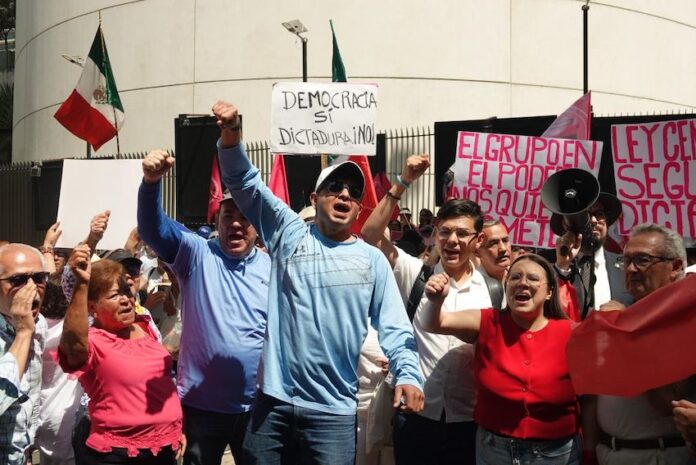The Mexican Bar Association and Stanford Law School’s Rule of Law Impact Lab have expressed their support for the Mexican Congress’ decision to “pause” the legislative process related to the federal government’s proposed telecommunications reform.
A comprehensive telecommunications reform bill aimed at significantly overhauling the Mexican government’s role in broadcasting and digital media legislation — and stopping (or at least limiting) the dissemination of foreign government propaganda in Mexico — was approved by Senate committees on April 24.
The committees’ approval of the bill paved the way for the proposed legislation to be considered by all 128 senators. But before that could happen, the executive board of the upper house of Congress withdrew the proposed legislation on the advice of President Claudia Sheinbaum, who advocated prior dialogue with stakeholders and modifications to the bill.
The Senate last week approved a format for that dialogue to take place, and relevant senators said that a new bill would be drawn up in coming weeks after the views of stakeholders have been heard.
In a joint statement issued on Monday, the Mexican Bar Association (Barra Mexicana, Colegio de Abogados, or BMA) and Stanford Law School’s Rule of Law Impact Lab expressed their “recognition of the decision to pause the legislative process” related to the proposed telecommunications law in order to “allow a broader and more informed discussion.”
“The proposed law — submitted by the Executive Power — provides for excessively broad and ambiguous provisions that would authorize the Agency for Digital Transformation and Telecommunications to temporarily block digital platforms at the request of the relevant authorities without clearly defining the applicable circumstances or establishing adequate control mechanisms,” the statement said.
“The breadth of these powers and the lack of precision in their regulation have aroused deep concern due to their possible impact on freedom of speech and the right to information, as well as the legal uncertainty they generate,” said the statement signed by BMA president Ana María Kudisch and Rule of Law Impact Lab executive director Amrit Singh.
Other critics of the proposed law warned that it would open the door to government censorship of the media.
Sheinbaum moved quickly to allay those concerns, even suggesting that the relevant text be modified to clarify that her administration has no intention of censoring content.
Article 109 of the bill “should be removed or its wording modified to make it absolutely clear that the government of Mexico is not going to censor anyone, especially not what is published on digital platforms,” she said on April 25.
Sheinbaum has argued that the proposed legislation is needed to stop foreign governments from broadcasting political or ideological propaganda in Mexico.

Opposition lawmakers claimed that the original legislation promoted censorship as digital content platforms such as Facebook would be prohibited from publishing in Mexico any advertising or propaganda financed by a foreign government, except for cultural or touristic information.
Ricardo Anaya, a National Action Party senator and 2018 presidential candidate, asserted on X on April 24 that the ruling Morena party is “going for total control of the internet, social media, radio and TV.”
“… This is not an isolated incident. It’s part of a plan of censorship and control,” he wrote.
Sheinbaum’s submission of the proposed legislation to Congress came after the U.S. government took its anti-immigration message to Mexican airwaves in April.
The reform entails much more than a reaction to the U.S. anti-immigration ads. Supporters have emphasized, for example, that the reform is a serious effort to bridge the nation’s persistent digital divide.
BMA: Any telecommunications regulation must meet international freedom of speech standards
After acknowledging that Sheinbaum had acknowledged “the need to open a process of dialogue” on the proposed telecommunications law, the BMA and the Rule of Law Impact Lab said that “any telecommunications and broadcasting regulation must align with international freedom of speech standards.”
Those standards, they added, are “essential pillars” of all law-abiding democratic states.
The BMA and the Rule of Law Impact Lab (headed up by the daughter of recently deceased former Indian prime minister Manmohan Singh) said that “the future discussion” on the telecommunications proposal should include a “rigorous analysis from a human rights perspective,” and consider, in particular, “the right to freedom of speech in accordance with the current constitutional and international framework.”
“Only through a focus that places the dignity of the individual and the public duty of communication at the center will it be possible to design legislation that strengthens democracy, instead of weakening it,” they said.
With reports from López-Dóriga Digital, El Universal and Milenio
